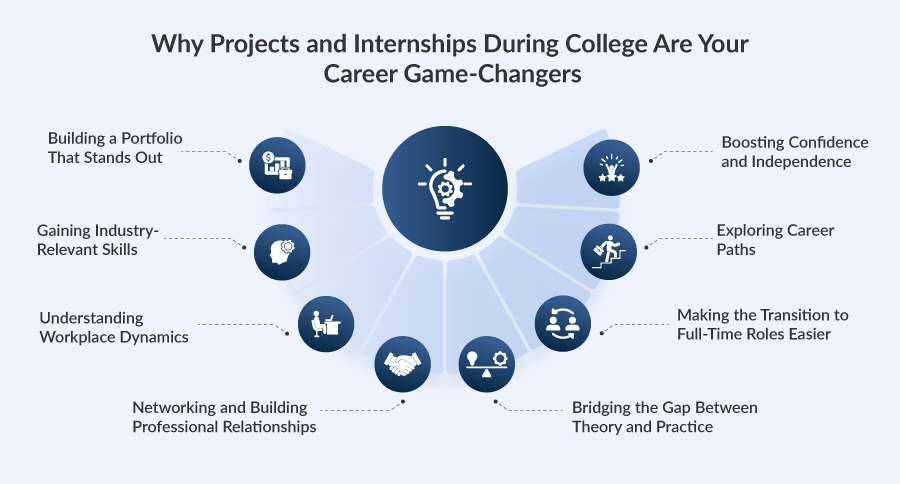Why Projects and Internships During College Are Your Career Game-Changers
College is more than just attending lectures and acing exams—it’s the perfect time to roll up your sleeves and get hands-on experience through projects and internships. These opportunities don’t just fill up your resume; they give you real-world exposure, practical skills, and a head start in building your career.
In fact, statistics back this up: according to Flair HR, completing internships increases job offers by 16%, and graduates with internship experience earn $2,082 more annually on average. Additionally, 66.4% of graduates who underwent paid internships received job offers, with a retention rate of 71.4% after one year for those who interned with their hiring company.
Let’s explore why projects and internships should be a top priority during your college years.

- Bridging the Gap Between Theory and Practice: While classroom learning is crucial, it often focuses on the theoretical aspects of your field. But what happens when you need to apply those concepts in real situations? That’s where projects and internships come in. They help bridge the gap between what you learn in textbooks and what you’ll face in the workplace.
When you take on a project or internship, you learn how to apply concepts in a dynamic environment. It might involve troubleshooting issues you’ve never encountered or using tools you’ve only heard about in class. These experiences sharpen your problem-solving skills and give you the confidence to tackle real-world challenges head-on. - Building a Portfolio That Stands Out: In today’s competitive job market, having a solid GPA isn’t enough to make you stand out. Employers want to see what you can do—tangible proof of your skills and capabilities. That’s where projects and internships shine. They offer you the chance to build a portfolio of work that demonstrates your practical experience and expertise.
Imagine presenting a project where you developed a mobile app, improved a company’s marketing strategy, or helped streamline a process during your internship. These concrete examples will make your resume pop and catch the attention of hiring managers. Plus, showcasing these projects in a portfolio not only highlights your skills but also shows your initiative and drive to learn outside of the classroom. - Gaining Industry-Relevant Skills: Every industry evolves, and so do the tools and technologies it uses. Internships and projects give you a chance to familiarize yourself with the latest tools, platforms, and methodologies that you might not encounter in your coursework. Whether it's using agile development frameworks, learning project management tools, or diving into a new programming language, this hands-on experience ensures you’re industry-ready by the time you graduate.
Moreover, internships often give you a glimpse into the specific skills employers are looking for. You might discover a new area of interest or even pick up a skill that becomes the foundation of your future career. - Networking and Building Professional Relationships: It’s often said that your network is your net worth—and that’s especially true early in your career. Internships offer the perfect environment to start building a professional network. By interacting with coworkers, supervisors, and even clients, you start forming relationships that can open doors to future opportunities.
Don’t underestimate the power of these connections. Internships can lead to job offers, mentorship, or even recommendations for future positions. Having a solid network can help you navigate your career path and give you a competitive edge when it’s time to apply for full-time roles. - Understanding Workplace Dynamics: One thing that projects and internships offer that the classroom can’t is the opportunity to experience the dynamics of a real workplace. Through internships, you learn about workplace culture, teamwork, communication, and time management. You also discover how different departments collaborate, how decisions are made, and what the day-to-day workflow looks like in your chosen field.
This exposure is invaluable when transitioning to a full-time role after college. It helps you develop soft skills like adaptability, communication, and conflict resolution, which are just as crucial as technical expertise. Additionally, by experiencing various workplace settings, you can figure out what kind of environment you thrive in—whether it’s a fast-paced startup or a more structured corporate setting. - Boosting Confidence and Independence: When you complete a challenging project or internship, you leave with more than just new skills—you also gain a sense of confidence and independence. These experiences teach you how to work through obstacles, make decisions, and deliver results. The sense of accomplishment you feel after completing a successful project or navigating a tough internship can be a game-changer for your self-esteem.
As you continue to take on new projects, you become more comfortable stepping outside your comfort zone and pushing your limits. This growth mindset will serve you well throughout your career as you encounter new challenges and opportunities for advancement. - Exploring Career Paths: One of the biggest benefits of internships and projects is the ability to explore different career paths. Sometimes, the major you’ve chosen might not align with the type of work you enjoy, or you may discover a passion for something unexpected. Internships give you a taste of what various roles or industries are like before you commit to a full-time career.
For example, you might be studying computer science, but after an internship in cybersecurity, you realize that’s where your true interest lies. Or maybe a marketing project during college ignites a passion for digital strategy that reshapes your career trajectory. Projects and internships offer invaluable insights, helping you make informed decisions about your future career path. - Making the Transition to Full-Time Roles Easier: When it’s time to transition from college to a full-time job, those who’ve completed internships and significant projects often have an easier time. Not only do these experiences beef up your resume, but they also prepare you for the expectations and pace of the working world. You’ve already built a foundation, so you can hit the ground running in your first full-time position.
Many companies use internships as a pipeline for future employees, too. If you’ve done well during your internship, there’s a good chance you’ll be offered a full-time role or referred to other opportunities. Even if the internship doesn’t lead to a direct offer, the experience itself makes you a more attractive candidate to other employers.
Projects and internships are more than just a stepping stone—they’re your gateway to real-world experience, industry knowledge, and personal growth. They help you build a strong portfolio, sharpen your skills, and build a network that can propel your career forward. Don’t wait until you graduate to get started—seek out projects and internships now, and set yourself up for success in the future. The sooner you take the plunge, the better prepared you’ll be for the world that lies beyond college.
Statistics Sources: Flair HR




